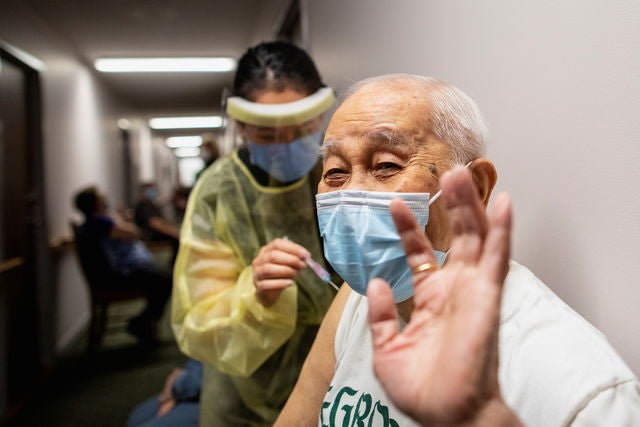Global health highlights from 2022
Exemplars News looks at the year in global health, which began with a sobering surge of COVID but ended with progress against the pandemic, mpox, Ebola, malaria, and a host of other challenges
Global health highlights from 2022

The year that began with the largest surge in COVID-19 cases since the pandemic hit, ended on a high note. After three years during which more than 6 million people died and more than 600 million confirmed cases, COVID infection and death rates around the world finally began a rapid decline towards the end of 2022, with the notable exception of China.
While health leaders are certainly not calling the pandemic over, there are indications that its impact is on the wane. This has been driven, in part, by the fact that health systems have succeeded in reaching nearly 70 percent of people globally with at least one dose of a COVID vaccine. Remarkably, 66 percent of people globally are fully vaccinated. Even some countries that were once laggards in COVID vaccination saw astonishing progress. For example, over the course of four months in 2022, COVID vaccination rates in Tanzania surged from an average of 15% to 70%.
Another health emergency that appears on the decline is mpox, formerly called monkeypox. Worried health officials around the world watched as the virus quickly spread around the world, with thousands of new cases being reported each day during its peak. An estimated 80,000 cases of mpox were reported around the world over the course of 2022, more than a quarter of them in the United States. But the peak of the epidemic, like COVID, appears to have been in July and August, with infection rates falling rapidly since then.
Meanwhile, authorities in Uganda have just declared victory against an outbreak of the Sudan strain of Ebola. The short-lived outbreak in Uganda started on September 20, infected 142 people, and killed 55 of those infected (39%). The outbreak was officially declared over on January 11, when there were no new cases detected for a total of 42 days, which is twice the usual incubation period for Ebola infections. The outbreak renewed efforts to develop a vaccine against the Sudan strain of Ebola.
The fight against malaria also took a historic step forward last year after the WHO recommended the broad use of the world’s first malaria vaccine in areas where children are at risk of malaria illness and death. Already, more than three million doses have been delivered to more than one million children in Ghana, Kenya, and Malawi. Authorities in those countries expect to double the number of children who receive the vaccine in the next year.
In 2022, countries around the world also stepped up efforts to protect the health of girls. Zimbabwe outlawed child marriage and Senegal took early steps to do the same. Exemplars research, in addition to a wealth of other global research, shows that reducing adolescent pregnancies can drive reductions in childhood stunting and maternal mortality.
Similarly, Cameroon changed its national regulations to allow pregnant girls to attend school. A wealth of global research demonstrates that educating girls is not only important for their human rights, it powers individual and national economic growth, and has a protective effect for the girls’ individual health and the health of their children. Allowing pregnant girls to continue with their studies can also help reduce repeated adolescent pregnancies.
Other highlights and milestones in 2022 in global health that Exemplars News covered included Burkina Faso’s success curbing of under-five mortality; Botswana nearly eliminating mother to child transmission of HIV; Kenya, Malawi, and Senegal’s expansion of access to family planning; Guinea worm nears global eradication; Zambia’s use of data and community health workers to cut malaria deaths by more than half; and Costa Rica’s investment in primary health care to achieve some of the third highest life expectancy in the Western Hemisphere.
How can we help you?
believes that the quickest path to improving health outcomes to identify positive outliers in health and help leaders implement lessons in their own countries.
With our network of in-country and cross-country partners, we research countries that have made extraordinary progress in important health outcomes and share actionable lessons with public health decisionmakers.
Our research can support you to learn about a new issue, design a new policy, or implement a new program by providing context-specific recommendations rooted in Exemplar findings. Our decision-support offerings include courses, workshops, peer-to-peer collaboration support, tailored analyses, and sub-national research.
If you'd like to find out more about how we could help you, please click . Please consider so you never miss new insights from Exemplar countries. You can also follow us on Twitter and LinkedIn.
